Russia's Putin Speaks To Iran, Others On Mideast Conflict

Russia’s President Vladimir Putin, who has been isolated on world stage, entered the diplomatic fray of the Israel-Hamas war on Monday speaking with regional leaders.

Russia’s President Vladimir Putin, who has been isolated on world stage, entered the diplomatic fray of the Israel-Hamas war on Monday speaking with regional leaders.
Putin who spoke with Iran’s President Ebrahim Raisi and leading Arab powers in an attempt to secure a ceasefire in the war between Israel and Hamas.
Raisi was quoted as telling Putin that supporting the Palestinians is Iran's foreign policy priority, but the "resistance" groups make their own independent decisions, Iranian state media reported.
They quoted Raisi as also telling the Russian president: "There is a possibility of the conflict between Israel and Palestinians expanding to other fronts."
Iran’s clerical rulers, who have supported militant Arab groups for four decades with money, weapons and training, celebrated the Hamas attack on Israel and the killing of over 1,400 Israelis. The United States has warned Tehran not to get directly involved, as it has sent a powerful naval task force to the Eastern Mediterranean to deter Iran’s proxy the Hezbollah from opening a northern front against Israel.
Russia, which has relationships with Iran, Hamas, major Arab powers as well as with the Palestinians and with Israel, has repeatedly said the United States and the West have ignored the need for an independent Palestinian state within 1967 borders.
Russia’s relations with the West have significantly worsened after it invaded Ukraine last year trying to replace the government in Kyiv and annex large parts of the country.
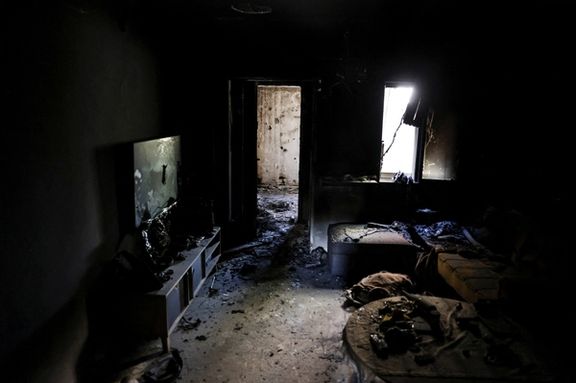
Iran has defended the Hamas attack on Israel that has killed at least 1,500 as “a natural response within the framework of legitimate rights.”
Foreign Ministry spokesman Naser Kanaani said during his Monday press conference that “the actions taken by the resistance front were within their rights, in response to the Zionist crimes against Palestinians.”
Kanaani held photos of the aftermath of the bombing on Gaza which followed the infiltration of militants by air, land and sea, slaughtering hundreds of civilians, and reiterated Tehran’s warning that if the offensive on the enclave continues, the situation could escalate beyond control, “jeopardizing international peace and security.”
However, when he was directly asked about Iran engaging in the war in case of Israel's ground offensive in Gaza, Kanaani dodged a tangible response and only said that Hamas can defend itself. Thousands of Hamas operatives infiltrated Israel by land, air and sea on October 7, massacring hundreds of civilians and kidnapping at least 199 into Gaza, including women and children.
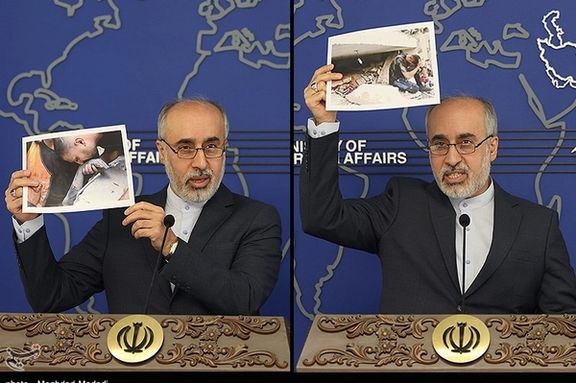
Kanaani said that the actions “cannot be limited to a single front,” and that Israelis "expose themselves to all sides that consider themselves committed to supporting the Palestinian people," suggesting its proxies on Israel's Lebanese and Syrian borders will once again be mobilized. On Sunday, Hezbollah began its most active day of attacks against Israel since the war began as tensions simmered and 28 towns and villages in Israel were subsequently evacuated.
Kanaani claimed that the Palestinian resistance represents the Palestinian nation against Israel, a statement that directly contradicts remarks by Mahmoud Abbas, the president of the State of Palestine and the Palestinian National Authority. Abbas criticized Hamas on Sunday but then quickly rescinded the comment after alleged pressure from Hamas which controls the Gaza Strip.
Palestinian news agency WAFA initially quoted Abbas telling Venezuelan President Nicolas Maduro that Hamas’ policies and actions “do not represent the Palestinian people", the Palestine Liberation Organization the only legitimate representative of the Palestinian people. The reference to Hamas was later removed, the statement only claiming "the PLO is the sole legitimate representative of the Palestinian people, and not the policies of any other organization.”
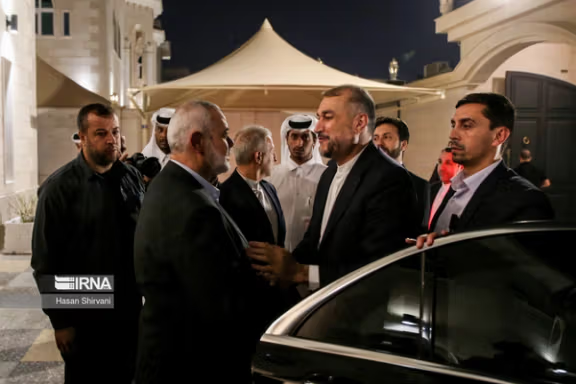
Iran’s Foreign Minister Hossein Amir-Abdollahian, who arrived back in Iran after a tour of Iraq, Syria, Lebanon and Qatar Monday, has been equally threatening in his language, warning of a “huge earthquake” in Israel if airstrikes continue on the Gaza Strip. Meanwhile, the regime continues to deny its being behind the war declared by Hamas on October 7.
Amir-Abdollahian met with leaders of Hamas, Hezbollah, and Islamic Jihad during his trips to gain accurate intelligence on the status of Hamas on the “battleground,” the Iranian diplomat said. Hamas has reassured Iran that it has the “necessary equipment” to confront Israel, not surprising after years of being funded at least $100m annually in addition to military and logistical support.
After his meeting with Hezbollah leader Hassan Nasrallah over the weekend, Amir-Abdollahian said “I know about the scenarios that Hezbollah has put in place. Any step the resistance will take will cause a huge earthquake in the Zionist entity.” Hezbollah, the biggest of Iran's proxies, garners at least $700m a year in funding, and is known to have a far greater arsenal at its fingertips thanks to regime support, which the group showcased just weeks ago at a military exhibitionfor the media.
The regime terms Israel "the Zionist entity" or "Zionist regime" and the "resistance" front or axis is the term to describe Iran's logistic, financial and intelligence support for Palestinian terrorist groups such as Hamas and Islamic Jihad. It also supports proxies on Israel's other borders, Iran and Lebanon, in addition to several others around the region.
Amir-Abdollahian is scheduled to travel to Saudi Arabia for an urgent open-ended extraordinary meeting of the Organization of Islamic Cooperation (OIC) on Wednesday to address the escalating war. The meeting was called by Riyadh, which until the war broke out was teetering ever closer to a normalization deal with Israel which Iran had vocally opposed, leading analysts to suggest the war was orchestrated to debilitate the talks.
While Iran tries to make it look like it is pursuing diplomatic means to end the crisis, the Islamic Republic’s authorities continue threatening Israel with destruction and are not shy about their military and intelligence support for Hamas. Echoing similar sentiments by Supreme Leader Ali Khamenei, Revolutionary Guard commander-in-chief Hossein Salami said Monday that the new Gaza war is “the first phase of the impending collapse of the Zionist regime.”
Iran sent a veiled warning through its UN mission on Saturday against Israel's potential ground invasion of Gaza. The Iranian message stressed that it does not want further escalation, but warned, "If the Israeli apartheid’s war crimes and genocide are not halted immediately, the situation could spiral out of control and ricochet far-reaching consequences".
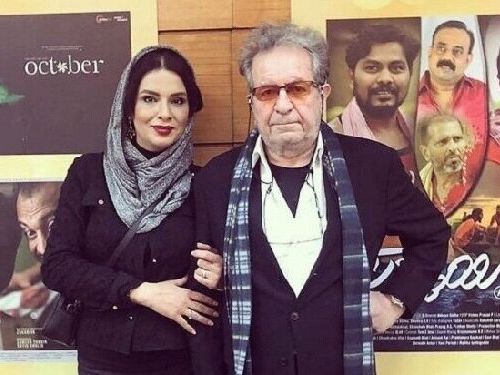
The brutal murders of renowned Iranian filmmaker Dariush Mehrjui and his wife Vahideh Mohammadifar has ignited a wave of condemnation of the country's dire security situation.
Prominent lawyer and rights defendant Nasrin Sotoudeh raised questions about the potential political motive behind the murder, calling for a referendum to establish a stable government. Mehrjui was notorious for his anti-regime views with suspicions laying at the door of the regime's own security apparatus.
She pointed out that no matter who the culprits, the current government appears incapable of ensuring its citizens' security.
According to Faraz Daily news website, the perpetrators cut the throats of the pair and broke their arms and legs. Mehrjui’s head was clobbered with a blunt object and his wife was almost beheaded.
Rasoul Sadr-Ameli, the spokesperson for the House of Cinema, declared a three-day period of public mourning starting from Monday to pay respects to Mehrjui. Additionally, all film projects across the nation are slated to be suspended for a day during the funeral procession for the revered director.
Renowned international actress and political activist, Golshifteh Farahani, directed a message to the Iranian authorities, referring to the punishment many have faced for speaking out against the regime over the years and the mass censorship which has only deepened since the Women, Life, Freedom protests. "How much do you torment Iranian artists," she said.
Haniyeh Tavassoli, a well-known actress who was detained during the 2021 protests, expressed her anguish with a poignant statement: "We are unfortunate. That's it. No further explanation is needed."
President Ebrahim Raisi claims to have directed a full investigation with reports indicating that seven suspects have been apprehended in connection with the murder so far.
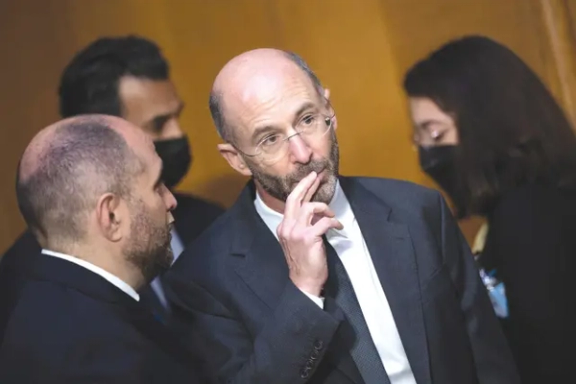
The US House Oversight Committee plans to subpoena Robert Malley, the suspended special envoy to Iran, as part of its investigation into US policies towards Iran.
According to senior committee aides speaking to Semafor website, the committee alleges that the government has obstructed Congress's repeated attempts to uncover the reasons behind the revocation of Malley's security clearance by US Diplomatic Security in April, which occurred two months prior to him being placed on unpaid leave.
Subsequently, US officials have informed Semafor that the FBI is conducting an investigation into Malley for the suspected mishandling of classified information.
The question is now to understand the truth surrounding Malley’s departure and his role in shaping overall Iran policy in addition to his involvement in negotiating the release of frozen Iranian oil revenues.
The committee is also seeking information about Ariane Tabatabai's security clearance and her involvement in the Iran Experts Initiative, a program that aimed to promote Iran's views on the nuclear negotiations. She serves as the Chief of Staff for the Assistant Secretary of Defense for Special Operations and Low Intensity Conflict (SOLIC).
Congress seeks to understand how these individuals influenced US policies towards Iran, and their support for engaging the Iranian regime. Malley and Tabatabai have defended their involvement in the Iran Experts Initiative, while the International Crisis Group, Malley's former employer, disputes allegations that it was controlled by Tehran.
Concerns about the Biden administration's Iran policy have escalated following Hamas' attack on Israel and speculation about Iran's role in the war.
While Iranian officials have welcomed Hamas' Operation Al Aqsa Flood, which has seen the death of at least 1,500, thousands more injured and 199 people from dozens of nationalities taken hostage, Iran has denied direct involvement. However, as part of its proxy network, it funds Hamas around $100m a year and offers military and logistical support.
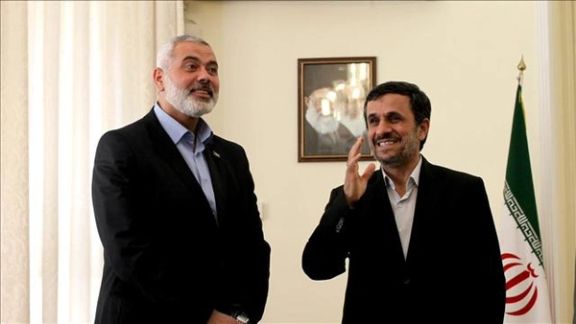
Some officials, including former President Mahmoud Ahmadinejad, are seemingly pressured in Iran to echo Ali Khamenei's support and praise for Hamas' attack on Israel.
Faraz Daily, an online newspaper reminded readers that Ahmadinejad used to deny the Holocaust and asked why he has been "silent in the face of Israel's crimes in Gaza" more than one week after Hamas's bloody attack.
The former president was in Guatemala during the past week to take part in a conference about water resources. However, he came back to Tehran on Saturday evening. Faraz Daily asked whether Ahmadinejad is afraid of taking an anti-Israeli stance under current circumstances, or he does not want to harm his popularity ahead of the upcoming parliamentary elections.
The reason for Ahmadinejad and others, including former hardline nuclear negotiator Saeed Jalili and their like-minded ultraconservatives in the Paydari Party, who have been criticized by the publication, is that these political figures may only echo Khamenei's praise and support for Hamas's atrocity and come under pressure from the Iranian public opinion that overwhelmingly supports Israel as it is evident from their social media posts, or risk being demonized and even prosecuted by Khamenei's hardline supporters.
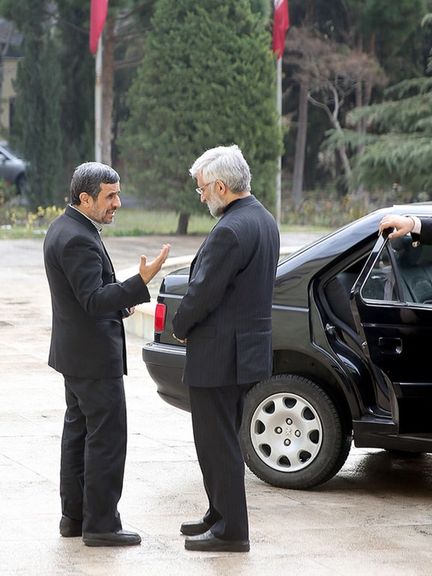
The reason Ahmadinejad, along with others like former hardline nuclear negotiator Saeed Jalili and their fellow ultraconservatives in the Paydari Party, have avoided to speak out is because if they do, they would be compelled to echo Khamenei's praise and support for Hamas's actions. However, the Iranian public opinion largely supports Israel, and they are caught between a rock and a hard place.
During the past week, former Reformist President Mohammad Khatami and former Foreign Minister Javad Zarif in social media posts and press interviews supported Khamenei's positions and immediately came under fire by the public for sympathizing with Hamas.
However, Faraz daily noted that although the state television in Iran, which is the closest media outlet to Khamenei, reflected Khatami and Zarif's opinions about Hamas, it continued its usual criticism of both Reformist figures. Khamenei’s hardliner loyalists do not miss an opportunity to attack anyone who might be slightly independent of the ruler’s rhetoric and confrontational policies.
The media coverage of Ahmadinejad and Jalili's silence may be an attempt by Iran's hardliners to pressure them and their like-minded politicians into expressing support for Khamenei. Since the 2022 protests, political backing for Khamenei has mainly come from staunch hardliners who support him, expecting his favor in return.
Former Parliament Speaker Ali Larijani also attempted to remain non-committal. He posted a typically equivocal tweet that was apparently about the war in Israel but didn't explicitly express support for Khamenei pro-Hamas rhetoric. Later, he deleted the tweet and shared an audio message on X, which was equally vague and did not provide the clear support for Khamenei that hardliners desired.
Centrist daily Sazandegi on Saturday criticized Ahmadinejad and Jalili as well Iranian Nobel laureates Shirin Ebadi (2003) and Narges Mohammadi (2023) for their silence about Gaza. However, the daily did not say why the members of Executives of Sazandegi Party, to which the newspaper belongs, have not been openly taking a stance on the Gaza war and why those mentioned in the article need to rush to express their opinion.
The purpose of the newspaper for attacking these individuals was possibly to show its loyalty to Khamenei in a bid to secure his approval for the candidacy of its affiliated party members in the upcoming March parliamentary elections.
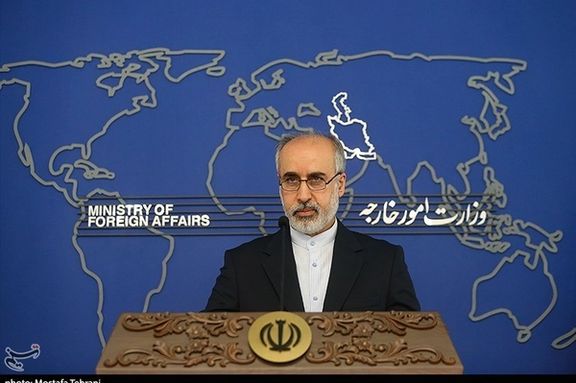
As Israel confirmed that 199 hostages are held in Gaza, Iran's Foreign Ministry claims that its proxy Hamas has expressed readiness to release civilian detainees.
In a Monday press conference, spokesperson for the Ministry of Foreign Affairs Naser Kanaani said, "The Palestinian resistance movement has informed us they are prepared to take necessary actions for the liberation of prisoners and non-military detainees they hold." Kanaani also emphasized the need for “specific prerequisites” to be met for this to become a reality.
There has been no announcement on this through official Hamas channels as yet, while countries including Qatar, Egypt and the US work to release the hostages, dozens of whom are from countries from Europe to north and south America.
While Israel prepares for a ground operation in Gaza, Kanaani used the press conference as a chance to legitimize the escalation of the conflict which began on October 7, when Hamas invaded Israel by land, sea and air, and massacred at least 1,400 people, including roughly 300 soldiers, with numbers rising.
Holding up posters related to the recent bombings in Gaza, Kanaani threatened that the continued path of conflict could "escalate the situation out of control, leading to a range of possibilities," insinuating its biggest proxy, Hezbollah, will get involved from Israel's northern front.
When questioned about whether Iran might directly intervene in the conflict, Kanaani did not provide a clear response. Instead, he referred to the capabilities of Hamas in self-defense and stated, "Hamas is capable in this domain, which is why the Zionist regime has avoided direct confrontation with resistance groups and has drawn the conflicts into non-military areas."
Hamas receives around $100m from Iran each year in addition to military support and training.
Top echelons of the regime continue to push for action against Israel. Ali Akbar Velayati, an advisor to Supreme Leader Ali Khamenei on international affairs, met with a representative of Hamas in Tehran on Monday. He stated, "You should move forward with all your might."